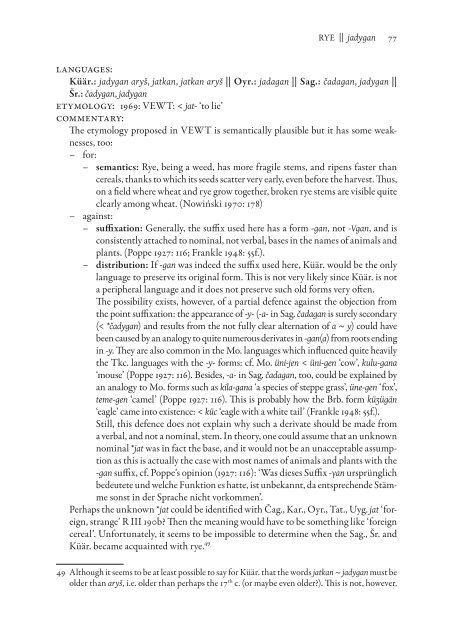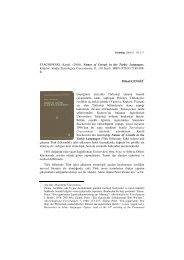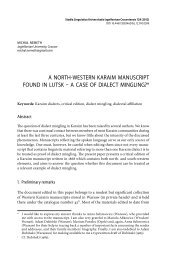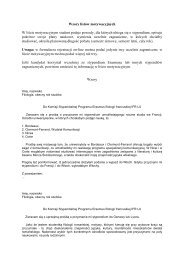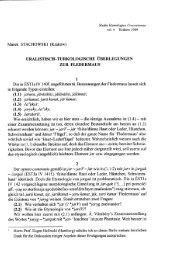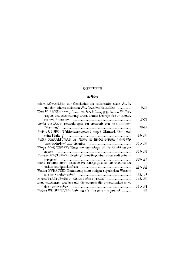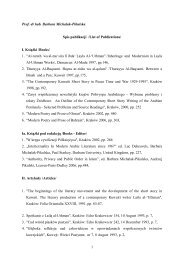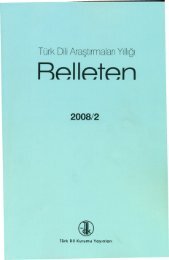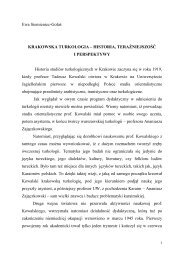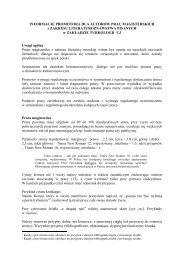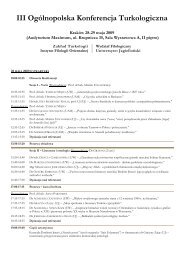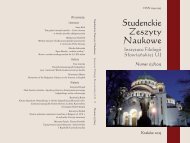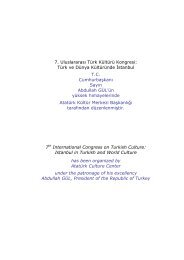Names of Cereals in the Turkic Languages - Wydział Filologiczny UJ
Names of Cereals in the Turkic Languages - Wydział Filologiczny UJ
Names of Cereals in the Turkic Languages - Wydział Filologiczny UJ
- No tags were found...
You also want an ePaper? Increase the reach of your titles
YUMPU automatically turns print PDFs into web optimized ePapers that Google loves.
Rye || jadygan 77languages:Küär.: jadygan aryš, jatkan, jatkan aryš || Oyr.: jadagan || Sag.: čadagan, jadygan ||Šr.: čadygan, jadyganetymology: 1969: VEWT: < jat- ‘to lie’commentary:The etymology proposed <strong>in</strong> VEWT is semantically plausible but it has some weaknesses,too:– for:– semantics: Rye, be<strong>in</strong>g a weed, has more fragile stems, and ripens faster thancereals, thanks to which its seeds scatter very early, even before <strong>the</strong> harvest. Thus,on a field where wheat and rye grow toge<strong>the</strong>r, broken rye stems are visible quiteclearly among wheat. (Nowiński 1970: 178)– aga<strong>in</strong>st:– suffixation: Generally, <strong>the</strong> suffix used here has a form -gan, not -Vgan, and isconsistently attached to nom<strong>in</strong>al, not verbal, bases <strong>in</strong> <strong>the</strong> names <strong>of</strong> animals andplants. (Poppe 1927: 116; Frankle 1948: 55f.).– distribution: If -gan was <strong>in</strong>deed <strong>the</strong> suffix used here, Küär. would be <strong>the</strong> onlylanguage to preserve its orig<strong>in</strong>al form. This is not very likely s<strong>in</strong>ce Küär. is nota peripheral language and it does not preserve such old forms very <strong>of</strong>ten.The possibility exists, however, <strong>of</strong> a partial defence aga<strong>in</strong>st <strong>the</strong> objection from<strong>the</strong> po<strong>in</strong>t suffixation: <strong>the</strong> appearance <strong>of</strong> -y- (-a- <strong>in</strong> Sag. čadagan is surely secondary(< *čadygan) and results from <strong>the</strong> not fully clear alternation <strong>of</strong> a ~ y) could havebeen caused by an analogy to quite numerous derivates <strong>in</strong> -gan(a) from roots end<strong>in</strong>g<strong>in</strong> -y. They are also common <strong>in</strong> <strong>the</strong> Mo. languages which <strong>in</strong>fluenced quite heavily<strong>the</strong> Tkc. languages with <strong>the</strong> -y- forms: cf. Mo. üni-jen < üni-gen ‘cow’, kulu-gana‘mouse’ (Poppe 1927: 116). Besides, -a- <strong>in</strong> Sag. čadagan, too, could be expla<strong>in</strong>ed byan analogy to Mo. forms such as kila-gana ‘a species <strong>of</strong> steppe grass’, üne-gen ‘fox’,teme-gen ‘camel’ (Poppe 1927: 116). This is probably how <strong>the</strong> Brb. form küʒügän‘eagle’ came <strong>in</strong>to existence: < küc ‘eagle with a white tail’ (Frankle 1948: 55f.).Still, this defence does not expla<strong>in</strong> why such a derivate should be made froma verbal, and not a nom<strong>in</strong>al, stem. In <strong>the</strong>ory, one could assume that an unknownnom<strong>in</strong>al *jat was <strong>in</strong> fact <strong>the</strong> base, and it would not be an unacceptable assumptionas this is actually <strong>the</strong> case with most names <strong>of</strong> animals and plants with <strong>the</strong>-gan suffix, cf. Poppe’s op<strong>in</strong>ion (1927: 116): ‘Was dieses Suffix -γan ursprünglichbedeutete und welche Funktion es hatte, ist unbekannt, da entsprechende Stämmesonst <strong>in</strong> der Sprache nicht vorkommen’.Perhaps <strong>the</strong> unknown *jat could be identified with Čag., Kar., Oyr., Tat., Uyg. jat ‘foreign,strange’ R III 190b? Then <strong>the</strong> mean<strong>in</strong>g would have to be someth<strong>in</strong>g like ‘foreigncereal’. Unfortunately, it seems to be impossible to determ<strong>in</strong>e when <strong>the</strong> Sag., Šr. andKüär. became acqua<strong>in</strong>ted with rye. 4949 Although it seems to be at least possible to say for Küär. that <strong>the</strong> words jatkan ~ jadygan must beolder than aryš, i.e. older than perhaps <strong>the</strong> 17 th c. (or maybe even older?). This is not, however,


